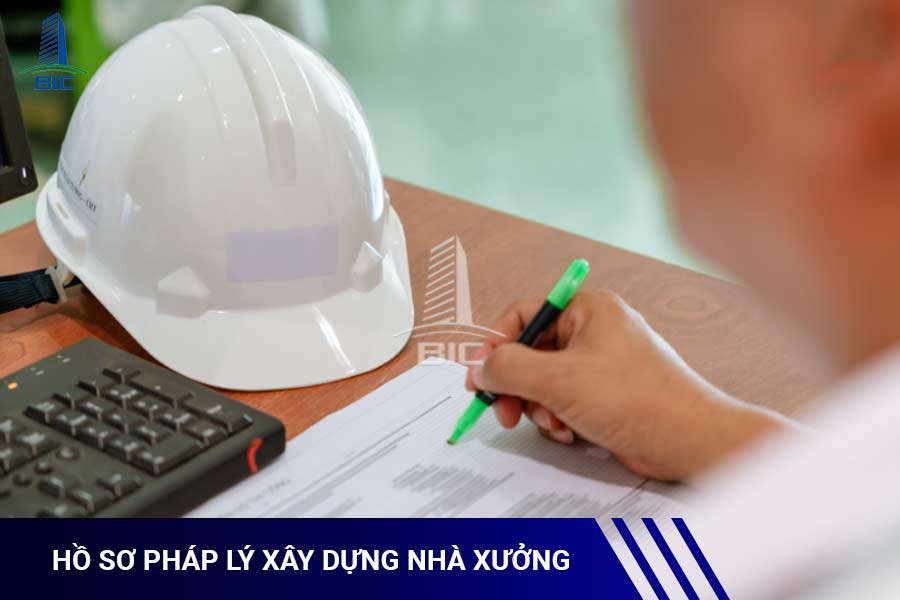
Constructing an industrial factory is a major investment activity that requires businesses to strictly comply with legal regulations. Beyond technical and design aspects, legal documentation is a mandatory condition for a project to be permitted for construction and operation. If the documents are incomplete or contain errors, businesses may face project delays, additional costs, or administrative penalties.
The legal documentation for constructing an industrial factory includes several important papers such as the land use right certificate, construction permit, fire prevention and fighting (FPF) approval documents, environmental impact assessment, design dossiers, and technical appraisal reports. Each type of documentation has its own procedures, processing times, and competent authorities. Understanding these requirements helps businesses prepare proactively and avoid unnecessary risks.
Moreover, preparing accurate and complete legal documentation ensures that the factory operates stably, in compliance with planning, and meets all safety and environmental standards. It also reflects a company’s professionalism and credibility with partners, clients, and regulatory authorities.
Legal documentation serves as the legal foundation for a project to be implemented and operated lawfully. For industrial factories, preparing a complete set of procedures is not only a regulatory requirement but also brings long-term benefits to businesses.
First, legal documents form the basis for obtaining construction permits and initiating works. When land, permits, and designs are approved, investors can confidently proceed with the project without legal concerns. This saves time and avoids construction suspension due to missing or non-compliant documents.
Second, completing legal documentation helps prevent risks and minimize additional costs. Errors in legal procedures can lead to administrative fines, demolition orders, or design modifications. Such consequences result in significant expenses and directly affect project schedules.
Additionally, legal documentation ensures that the facility operates safely and sustainably. Procedures related to fire safety, environment, and occupational health are the foundation for establishing a factory system that complies with standards, protects worker health, and passes regulatory inspections.
A full and transparent set of legal documentation demonstrates the professionalism and credibility of the business. This is particularly crucial for foreign investors or strategic partners, as legal compliance is a measure of management capacity and commitment to long-term development.

To proceed with a project and ensure lawful operation, businesses must prepare a complete set of legal documents. Each document serves a distinct function related to the project’s compliance.
Before drafting the project, investors must prove lawful rights to the land intended for construction. A land use right certificate is mandatory, and the land’s purpose must align with industrial production. The land also needs to be verified to ensure it does not fall under other planning categories such as agricultural land, defense land, or traffic safety corridors.
The construction permit is the prerequisite for breaking ground. The application usually includes:
- A standardized construction permit application form.
- Design drawings prepared by a qualified organization.
- Fire prevention and fighting approval documents and environmental/occupational safety records.
Accurate preparation of these documents ensures faster review and avoids rejection or delays.
For industrial factories, fire safety is one of the most stringent requirements. The dossier must include fire safety system design drawings, technical explanations, and supporting documents proving compliance with TCVN and QCVN standards. Only after approval by the fire safety police authority can construction of related systems proceed.
Depending on the project scale, businesses must submit either a full EIA report or a commitment to environmental protection. Large-scale factories with potential environmental impacts, such as chemical production, dyeing, or heavy machinery, require full EIAs. Smaller projects may be permitted to submit environmental protection commitments or plans instead. This serves as an important legal foundation ensuring that the factory operates in compliance and does not harm the surrounding environment.

Prior to construction, design documents must be verified and appraised by competent authorities or certified consultants. These include technical designs, construction drawings, structural explanations, and MEP systems. Appraisal ensures that the factory meets safety, load-bearing, and long-term operational requirements.
Depending on the type of production and local requirements, additional documentation may include:
- Agreements on power, water, and drainage connections.
- Industrial discharge permits for businesses with waste treatment systems.
- Occupational health and safety certificates, especially for industries with high risks of fire, explosion, or hazardous chemicals.
Preparing legal documentation for industrial factory construction must follow a systematic process to ensure compliance and shorten approval timelines. Key steps include:
Confirm that the land plot has a legal land use right certificate and is zoned for industrial purposes. Without proper land use, construction permits will not be approved.
This includes site planning, architectural layouts, structural plans, and basic MEP systems. These must be prepared by a qualified organization and serve as the basis for applying for construction permits.
Before applying for a construction permit, fire prevention approvals and environmental assessments (or commitments) must be completed. These are mandatory to ensure safe and environmentally compliant operation.

Submit the application to competent authorities such as the Provincial People’s Committee, Department of Construction, or Industrial Park Management Board. Required documents include the application form, detailed design drawings, fire safety approval, environmental documents, and land use right certificate.
Authorities will review the documents against regulations. If valid, a construction permit will be issued. Processing time typically ranges from 15 to 30 days, depending on project scale and complexity.
Once permitted, construction can begin. During implementation, design documents and permits serve as the legal basis for inspections. Any unauthorized changes or non-compliance may result in suspension.
Instead of struggling to prepare legal documents independently, many businesses choose to work with contractors or consultants specializing in legal compliance. This approach saves time, ensures legality, and supports long-term project success.
Professional consultants understand legal procedures, documentation requirements, and technical standards. They provide end-to-end support, from verifying land legality and preparing FPF and environmental documents to delivering compliant architectural, structural, and MEP designs. This minimizes common errors and ensures compliance.
One major risk of self-prepared documents is repeated rejection by authorities due to errors or omissions. Each rejection causes delays and additional costs. Experienced consultants prepare accurate documents from the outset, minimizing revisions and expediting approvals.

Professional contractors not only prepare legal documents but also support construction implementation. They coordinate with authorities and builders to ensure compliance with approved designs, avoiding unauthorized modifications. This helps projects meet deadlines and enter operation on schedule.
A complete and accurate legal dossier acts as a safeguard throughout factory operations. Regulatory inspections on construction, environment, or workplace safety can be resolved smoothly when the documentation is compliant from the start. This prevents administrative penalties, reduces production disruptions, and protects corporate reputation.
Legal documentation is the essential foundation for constructing and operating an industrial factory lawfully. Proper and compliant preparation not only prevents legal risks but also ensures construction progress and operational safety. A complete dossier also reflects professionalism and credibility with partners, clients, and regulators.
With extensive experience in industrial factory design and construction, BIC provides comprehensive solutions covering legal consulting, technical design, and construction support. Partnering with BIC ensures that businesses can confidently implement projects, save time, optimize costs, and guarantee compliance with all regulations.
Investing in legal documentation is an investment in the stability and sustainable growth of a business. With BIC by your side, you gain not only a lawful facility but also a solid foundation for expanding production and enhancing competitiveness in the market.